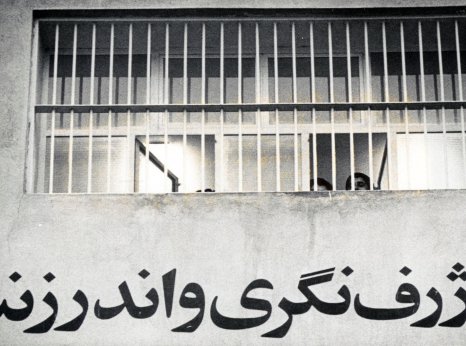Iran: Tehran Prisoners At Risk After Israeli Strikes

Shahr-e Rey prison in Varamin, Tehran province, has long been characterized by cruel and inhuman conditions. It is a disused chicken farm that holds women prisoners in extremely overcrowded and unhygienic conditions, without access to potable water, decent food, medicine or fresh air. For years, Amnesty International has documented prisoners reporting urine-stained floors, filthy showers and bathroom facilities, a severe shortage of beds and the prevalence of contagious diseases, as well as poor quality food containing rock particles and salty, undrinkable water. On 25 June 2025, the Instagram account of Sayeh Seydal, a woman prisoner who was transferred from Evin prison to Shahr-e Rey prison, published an audio recording of her from inside the prison following her transfer. In the recording, she said: “[After] the American and Israeli bombs didn't kill us, they [Iranian authorities] have brought us to a place to practically kill us. A place where no human should live. It [will be] a gradual death [for us]. They left all of us in quarantine…The smell of filth is everywhere... It’s as if [the Iranian authorities] want to take their revenge from Israel and the US on us political prisoners.” In a media interview on 30 June, Elhan Taifi, daughter of Fariba Kamalabadi, from the persecuted Baha’i religious minority, reported that women prisoners were unable to contact their families for two days following their transfer from Evin prison. She stated that, due to overcrowding, prison officials informed the women they would be held indefinitely in the quarantine section, an area typically used for just one or two days before detainees are moved to other wards. She also highlighted serious sanitary issues, including sewage overflow in one room, noting that the rooms are small and unhygienic. These inhuman conditions in Shahr-e Rey Prison have intensified the distress of the former Evin prisoners. Referring to the unbearable pressure on detainees, Elhan quoted her mother as saying: “I wish we had died from the missile strike, rather than live in this situation.”
The Greater Tehran Penitentiary has also long had cruel and inhuman conditions. For years, prisoners have reported severe overcrowding and the denial of medical care. A shocking video showing footage from inside the Greater Tehran Penitentiary, published by the BBC’s Persian language service on 1 July 2025, shows former Evin prisoners sleeping on the floor in a cramped space. In a sign of the families’ desperation to obtain information about their loved ones, prisoners’ families who have still not been in contact with their loved ones in prison posted on social media that they could not find them in the released footage. The prison does not separate prisoners convicted of non-violent offences from those convicted of violent offences in violation of international law, which requires that different categories of prisoners be kept in separate institutions or parts of institutions. On 30 June 2025, a moving letter from human rights defender Reza Khandan, a former Evin prisoner now in Greater Tehran Penitentiary, was published online. In the letter, he describes the violent transfer of prisoners and the dire conditions in their new prison: “…none of the injured prisoners…were taken to hospital. Instead of bringing calm, safety, and healing, they [armed guards] chained us in pairs…They were incapable of meeting prisoners’ most basic needs, but in just a few hours, they had assembled thousands of handcuffs, leg irons, and tools of repression…Prisoners who had just rescued the wounded hours earlier were now being targeted by security forces, guns pointed at their heads. We [didn’t sleep for] over 24 hours, and for nine hours, we didn’t even have drinking water. It has now been several days since our arrival. Still reeling from the trauma of the bombing and our horrific transfer, we were confronted with the harsh, chaotic conditions of this new prison. The overcrowding, disorganization, lack of hygiene, and insects swarming the packed rooms have made any moment of peace impossible…”
Prior to the Israeli air strikes, prisoners and their families raised concerns about the lack of protection for prisoners during the conflict and called for their release. In an open letter dated 18 June 2025, eight arbitrarily detained prisoners in Evin prison urged the Head of the Judiciary to protect the lives of prisoners, including by implementing a Supreme Judicial Council resolution allowing conditional release of prisoners during wartime emergencies. They also cited Iran’s Prisons Regulations, which state that when a prison population “exceeds an unacceptable level” (more than double capacity) or in times of “crisis such as natural disasters, unforeseeable incidents, or outbreaks of dangerous infectious diseases,” appropriate measures must be taken until the emergency situation is resolved. On 17 June 2025, Deutsche Welle Persian, a media outlet based outside Iran, reported that journalist Abdolreza (Reza) Valizadeh, who was arbitrarily imprisoned in section 8 of Evin prison, raised similar concerns in a message to the outlet. His message warned that an air strike on section 8 would endanger lives, as it lacks an emergency staircase and fire extinguishers. Informed sources told Amnesty International that section 8 was damaged during the air strikes. The Iranian authorities have announced that the Israeli air strikes on Evin prison killed at least 79 people, including prisoners, families of prisoners and administrative staff. One five-year-old child was also killed with his mother who worked in the prison.